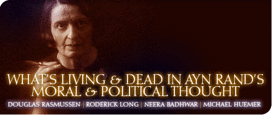Rod:
Doug thinks that the natural harmony of interests that the eudaimonist tradition largely embraces requires an agent-neutral conception of the good.
Neera:
Doug is right that the omission of the virtue of practical wisdom from Rand’s discussion is an important one. But I don’t find it surprising: she was not a systematic philosopher, and she omitted to discuss a whole lot of important things such as generosity, kindness, forgiveness, and charity.
Michael: ”… you’re going to have to rely on ethical intuition.”
I am dubious of the idea that what is objectively good and right for one person to do cannot ever conflict with what is objectively good and right for another person to do. Rod thinks I am dubious because I believe that the only way one can have harmony is by assuming agent-neutrality. I do not.
Though there are some advocates of eudaimonia that take an agent-neutral approach, I don’t think agent-neutrality is the hallmark of the eudaimonist tradition. This is not the basic issue, however. As I implied in my earlier remarks, it has to do with the place of individuality in one’s understanding of human good. Human flourishing is always and necessarily individualized, and this means not only that human flourishing does not exist apart from individuals but also that it only exists in an individualized manner. Though we can speak abstractly of generic goods and virtues and thus note what is common, these goods and virtues do not take on determinacy, reality, or worth apart from the excellent use of practical reason. This does not mean that there must be conflicts between one individual’s good and that of another’s, but it does mean that there can be. But more importantly, it does show that human flourishing is something different for each of us. Here is the pluralist dimension of ethics. (See Norms of Liberty, chapters 6 and 7)
This is why Rand’s failure to have a place for practical wisdom in her ethics is so disappointing. Practical wisdom is necessary for the presence of all of the virtues, including the ones she notes, as well as those she ignores or fails to emphasize. Indeed, it is indicative of a failure to truly appreciate the importance of individuality for ethical deliberations. I think this comes from an excessive rationalist approach to morality. I also think that this is part of the reason for the cultish behavior of many of her followers and some of the foundations devoted to her thought.
Neera is of course correct to say the Rand is not a systematic philosopher and that she omits many other important virtues as well, but I think that the omission of practical wisdom is a fundamental flaw because it undermines her ethical individualism.
Finally, Aristotle notes that nous goes in both directions — that is to say, it apprehends both the universal and necessary and the contingent and particular. So, there is certainly a place for direct insight — not all knowledge, including ethical knowledge, is discursive. But I think insight occurs within the context of metaphysical realism and natural teleology. As Foot has noted, “A moral evaluation does not stand over against the statement of a matter of fact, but rather has to do with facts about a particular subject matter.” So, I think we have insight into what human flourishing is as well as many other things. This is part of the story.

